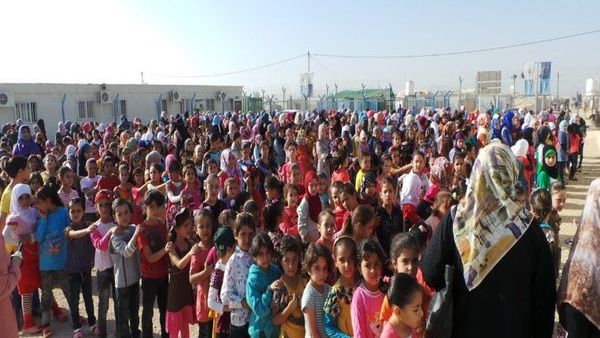The Netherlands on Sunday announced support through seven new programmes and projects worth 60 million euros (around JD45 million) in Jordan to alleviate the impact of the Syrian refugee crisis.
At a press conference at his residence in Amman, Dutch Ambassador Paul van den IJssel said these projects will be implemented in cooperation with the UN and international organisations, while more projects will be announced in 2017.
The ambassador explained that in response to the Syrian crisis, his country launched in May a special regional fund to support the directly affected countries — Jordan, Lebanon, Turkey and Iraq — with 260 million euros for three years.
The assistance programme, he noted, will run from 2016 to 2019, and the allocations for Jordan for this period will be 130.1 million euros.
The grants will support Jordan’s efforts in addressing pressing issues that include education, economic development, host communities, social cohesion, human rights and good governance, renewable energy, and humanitarian assistance, van den IJssel explained.
Projects whose implementation will start this year include contributing to the global commitment on education, which entails ensuring that all children have access to quality education through the Ministry of Education’s “Catch Up” programme, in partnership with UNICEF.
Through the Netherlands’ support, up to 8,000 children will be able to enrol in the formal education system after the end of level exam.
Robert Jenkins, UNICEF country director, said this programme will help children in Jordan, regardless of their nationality, who have missed more than three years of school to catch up.
This programme, he added, will be implemented in regular Jordanian schools, and most of those who will join it are Syrians.
Another programme that the Netherlands will support is providing education to Palestinian refugees who came from Syria.
Speaking at the press conference, Roger Davis, director of UNRWA operations, said that of the Palestine refugees who came from Syria during the crisis, 16,300 are registered with UNRWA and 50 per cent of them are children at school age.
The projects announced on Monday also include the hydroponic farming project that will be implemented through a Dutch consortium and ECO Consult in the cities affected by the refugee crisis.
A fourth project will be directed to benefit Jordanian and Syrian entrepreneurship, where the Dutch organisation SPARK will assist, guide and coach Jordanians and Syrians to either start up their business or expand existing initiatives, according to the ambassador.
Another project will be implemented through the Norwegian Refugee Council and the Justice Centre for Legal Aid to support improved legal access of Jordanians and Syrians.
Van den IJssel also highlighted a project that seeks to improve community policing in host communities to reduce pressures and address social tensions before they are exacerbated.
This programme will be implemented by the Public Security Department and SIREN.
Another project will be implemented by the alliance of Mercy Corps and Stichting Vluchteling to tackle challenges arising from lack of access to legal information and to equip young people with employability skills to enable them to secure jobs.
Meanwhile, the ambassador stressed that his country has been active in supporting Jordan since the beginning of the Syrian crisis.
“At the moment we are trying to help both Syrians and Jordanians to cope with the effects of the crisis which is now in its sixth year,” the ambassador told reporters, adding that the Netherlands welcomed the outcomes of the London conference for donors which took place in February, and since then, efforts have been stepped up to implement the agreements of that conference.
“We particularly work hard towards facilitation of the rules of origin that is one of the results of [the] London Conference,” van den IJssel said, adding that the Netherlands — during its time as president of the EU Council, and as a member state — has worked to bring all EU states on board and to come up with the relaxed rules of origin agreement.
“That we see [as] a success,” he stressed, adding that the agreement came into force in July; however, there is some criticism now that it does not match the Jordanian demand and it is difficult to find Syrian labour. I hear all these noises; I discuss all these noises; my view [is that] it is too early to judge…We [will] work towards its implementation,” the ambassador said.
By Khetam Malkawi








